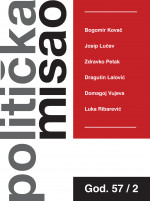Suvremena znanstvena relevantnost Marxove analize kapitala (u povodu rasprave o knjizi Daga Strpića Robna proizvodnja i udruženi rad u Marxovoj kritici političke ekonomije)
Contemporary Scientific Relevance of Marx’s Analysis of Capital
Author(s): Zdravko PetakSubject(s): Marxist economics, Political Philosophy, Marxism, Political economy
Published by: Fakultet političkih znanosti u Zagrebu
Keywords: Marx’s Critique of Political Economy; Institutionalism in Political Economy; Marx’s Theory of Crisis; Marx and Modern Economics; Strpić;
Summary/Abstract: The paper discusses the relevance of Marx’s analysis of capital and the manner in which that contribution is presented in the book on Marx’s critique of political economy written by Dag Strpić. At the beginning of the paper, the author indicates some elements of the general theoretical framework within which Strpić formulated his research on Marx’s critique of political economy. The paper raises two fundamental questions concerning Marx’s critique of political economy: 1. Can a fundamental starting point be drawn from Marx’s theoretical framework for understanding the importance of institutions in the economic process, as seen by the representatives of old and new institutionalism in political economy? 2. Can a unique explanation of economic crises be derived from reading Marx’s categorical apparatus? The answer to the first question shows that there are certain similarities between Marx’s approach and the approach advocated by economic institutionalists, but also there exist significant differences between the two approaches. The answer to the second question shows that Marx did not develop a unique theory of crises, since there are arguments indicating the existence of two or three different crisis theories which can be found in his work. After that, the author shows, using most general terms, that Marx’s critique of political economy is primarily situated by his attitude towards the classical school, but that it also has some potential to correspond with modern economics. The author shows that the direction of correspondence refers primarily to the explanation of fundamental tendencies in the development of the capitalist system. The conclusion of the paper reviews some of Strpić’s fundamental contributions to political economy.
Journal: Politička Misao
- Issue Year: LVII/2020
- Issue No: 02
- Page Range: 56-71
- Page Count: 16
- Language: Croatian

